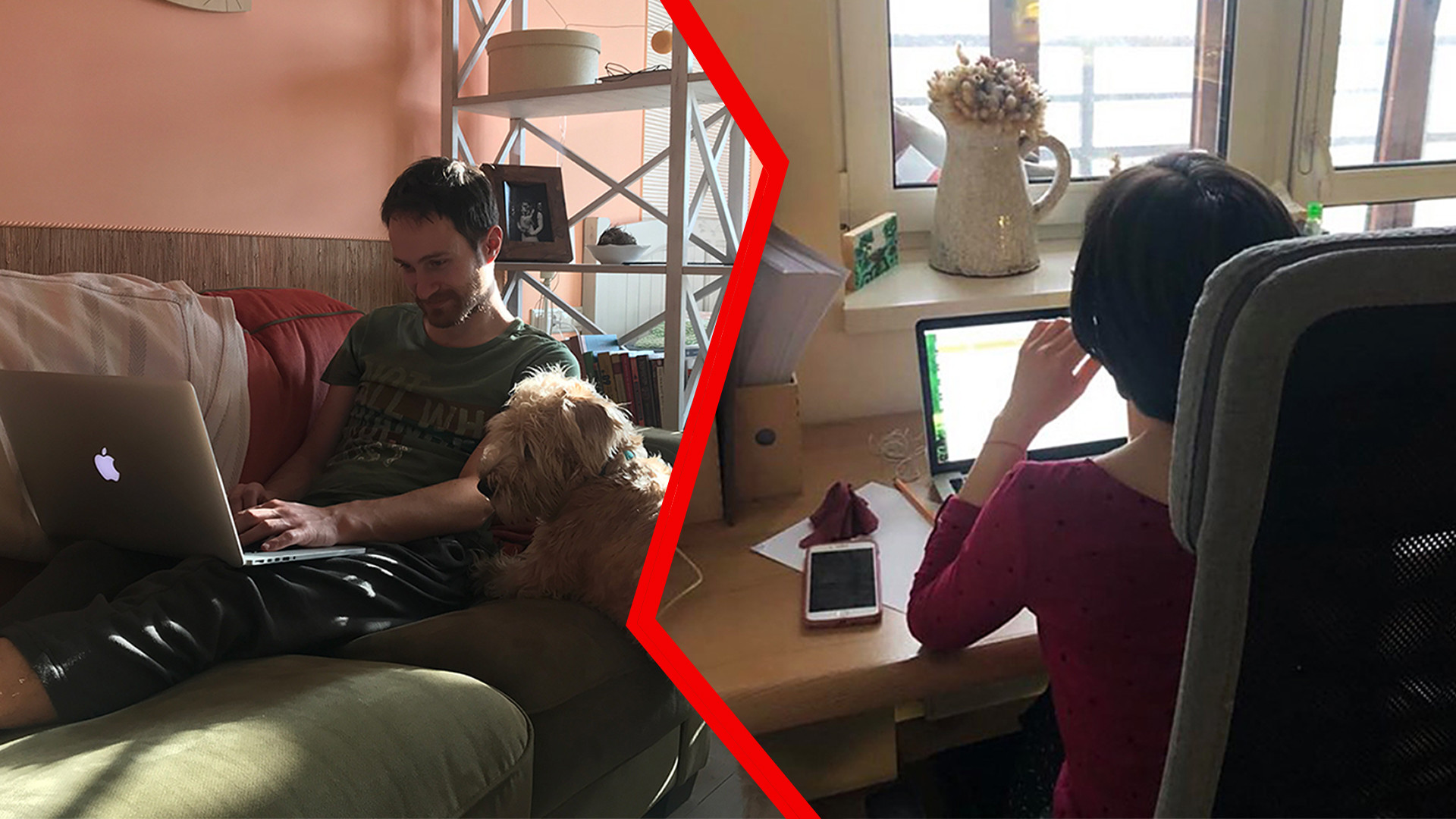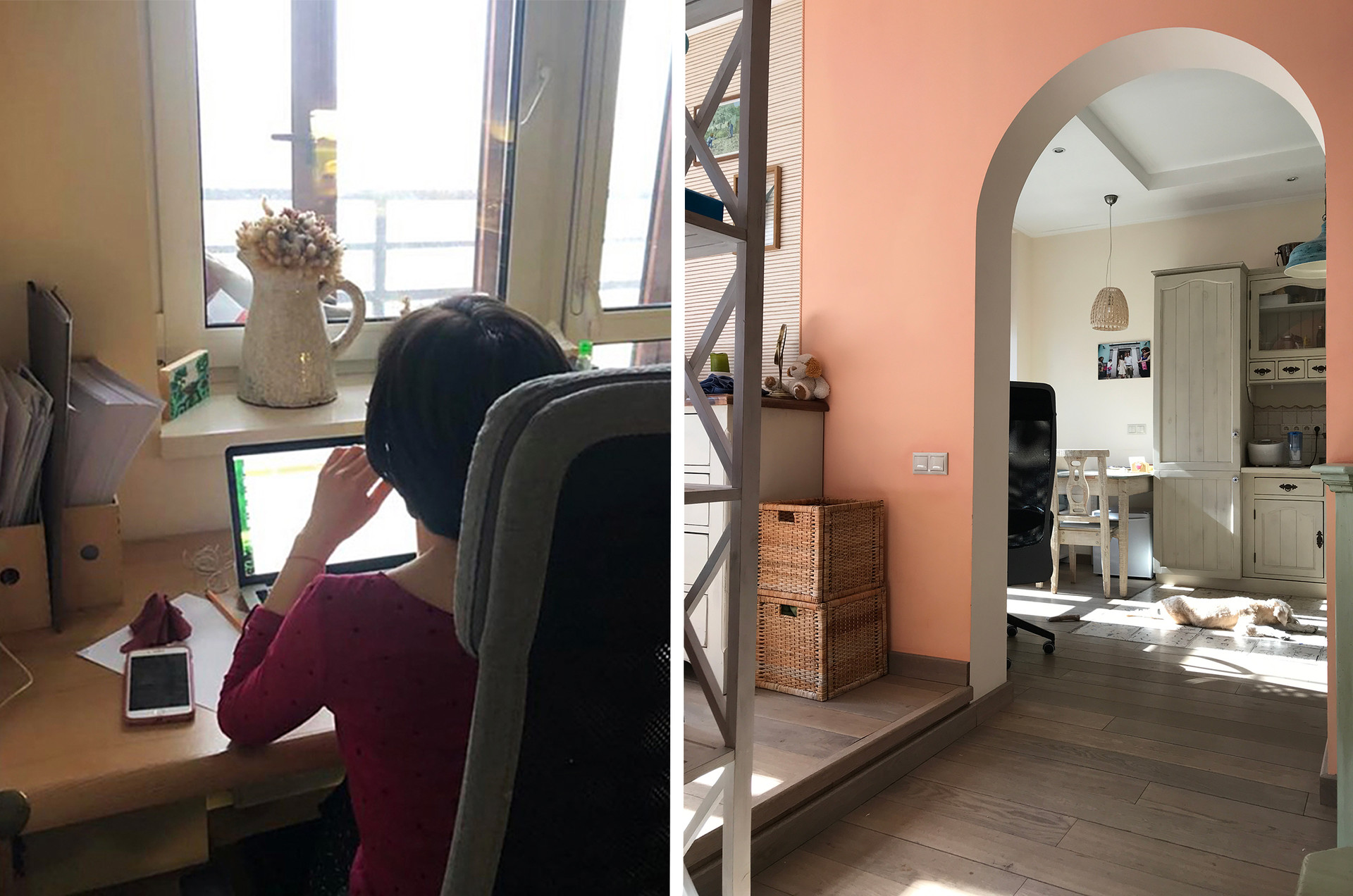
For the past seven years, I have mainly worked from home. Furthermore, it hasn’t just been me, as for most of the time, my wife has also worked from home. And we haven’t been working from an apartment with several rooms to choose from, but rather from a small studio, in which you cannot escape each other… Therefore, in light of the latest developments, I would like to share my experience of how to minimize the stress when two people are working from home in tandem and in a restricted space.
The main problem arises from the lack of a boundary between the work and home contexts, and the respective roles they fulfil.
First and foremost, it is the home context that seeps into the work context, because the established routine is that when you are together at home, you are not working. So you can easily start thinking that if your partner is close to hand all the time, it means that they can always set their work aside and give you their attention. And the most dangerous thing is that the other partner begins to think the same.

Since psychologically, you regard conversations with your loved ones as important, a conflict of priorities from the different spheres of life arises. On hearing a request to do something on the domestic front, you will want to do it straight away or, at the very least, make a mental note not to forget to do it later. For example, when you hear the phrase “We ought to pay the bills…” when you are working, you will almost certainly switch your attention from the work you are doing, in order to mentally process this request. More often than not, people respond to such an “intrusion” in a swift and brusque manner - with an abrupt remark along the lines of: “Can’t you see I’m working?!” Such a response can work, of course, but only in the short term - if repeated a lot of times, it will most likely lead to increased tension in relations between the two partners.
The flip side is when the work context invades personal relations. Each of us has their own idea of how to do our work, and most people in everyday life rarely have any idea of the working style of their loved ones.
And now imagine that you have suddenly arrived in your partner’s office and are watching them work. From your point of view, it might seem they are not doing things right - inefficiently, not confidently enough, too hastily, and so on and so forth. You have a strong temptation to give them advice and teach them how to do it. And the worst thing is that you want to impart your advice here and now, to approach them from behind, stand over their shoulder, and tell them: “This can be done differently, let me show you.” It goes without saying that such behavior would be far from welcome.

Our projections manifest themselves even more starkly when it comes to “procrastination”. It may seem to you that all your loved one does all day is drink tea / stay glued to Instagram / or watch ‘Dud’ [Yury Dud is a popular YouTube interviewer - Russia Beyond]. There is a danger of ending up like a strict parent, endlessly making sure that the other person is working and not getting distracted…
And the icing on the cake is the desire to protect the other person from malicious colleagues / the boss / contractors. This is particularly true of men, who go out of their way to defend their “defenceless and feeble womenfolk”. Well, we all know the saying about the road to hell and good intentions...
In essence, the above problems derive from an erosion of boundaries between two different contexts and roles. And this essential fact also dictates the broad outlines of a solution, which is to attempt to draw a line of demarcation between the two contexts as much as possible.
The simplest and most effective method is to demarcate these processes in space and time. If you can, work in different rooms. If you can’t, simply try to stay out of each other’s field of vision as much as possible. If you normally listen to music while you work, use headphones.
It’s also important to establish a routine, since problems arise most frequently at times when you are switching between work and household duties: At the beginning and end of the working day, and also when it’s time to break for lunch. The latter is particularly difficult when you have lunch together and one of you has stopped working and starts preparing (or ordering) something to eat and the other is still busy. The bitterest arguments occur on an empty stomach, so tread warily.

The measures outlined above should be enough to eliminate most of the symptoms. Nevertheless, to ensure that the rules are adhered to, you’d be well advised to explain to your partner why all this is needed. And the most important thing is to convey to them that your distancing during working hours does not mean that you love and respect them less. Quite the opposite: You want to preserve that part of your relationship that is so important to you.
To avoid the other symptoms, you need to look deeper. The erosion of limits is a problem in relationships in general, and a joint ability to uphold them can only be a good thing for your relations. So the most important thing here is to acknowledge that there is another person in front of you, with their own needs, distinctive traits and rights. However close you are to them, you do not own them and cannot impose your own terms on them. All you can do is to accurately convey your wishes and complaints to them and count on their cooperation.
First, make your wishes known plainly, without evasiveness or beating about the bush. If you want your partner to do something, be clear about it. Don’t wait until they guess what it is. This is the main cause of rows. The sooner you say what you want and the more explicit you are about it, the quicker your wish will be met (or rejected, in which case you will look for alternatives).
Second, if there is some bone of contention, try not to brush it under the carpet. It is much better to discuss it, but only when the situation is already a little behind you. There is no point in being contentious when you are still in the middle of an awkward situation.
Third, if you want to state your position when you’re not happy about something, try to start by expressing your feelings on the subject. For instance, say: “It hurts me very much to say no when you want my attention. But just at this moment I’m… “

“It makes me mad” and “It annoys me” are also feelings, but behind them is almost always some sore point or unsatisfied need, so - insofar as you are aware of what it is - try to look further than your annoyance. In this way, the person close to you will realize more quickly that the problem is not just them, but your reactions.
A final thought: The present situation is an excellent opportunity for you to find out more about each other, and therefore about yourselves, and for your relations to attain a new and deeper level. And who knows - perhaps you will end up deciding to throw in your lot with each other and creating something together.
If using any of Russia Beyond's content, partly or in full, always provide an active hyperlink to the original material.
Subscribe
to our newsletter!
Get the week's best stories straight to your inbox